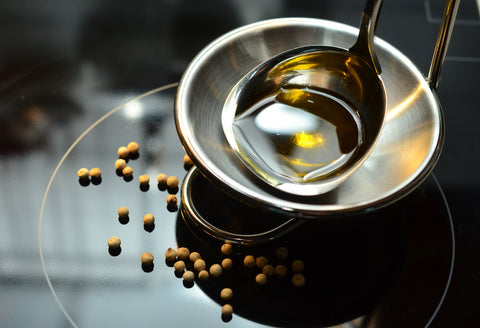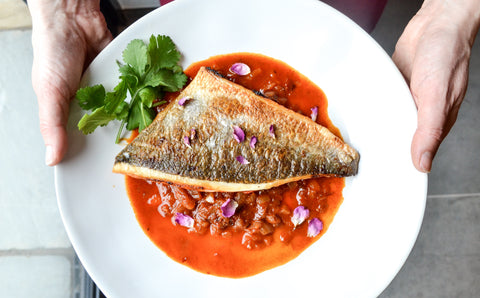on orders over $99
(excludes perishable items)
on orders over $99
(excludes perishable items)

What happens when foreign substances, such as bacteria, toxins, and pathogens, invade your body? Naturally, your body’s immune system activates to protect and heal itself. The immune system’s response to injuries and illnesses triggers inflammation, which is helpful, but excess inflammation (prolonged acute or chronic) is not ideal. Severe inflammation can result in chronic inflammatory diseases such as cardiovascular disease, type II diabetes, and cancer. Reducing and preventing inflammation from remaining in your body may be difficult, but don’t worry, your diet can help! What and how you eat has substantial effects on your body, and anti-inflammatory foods can reduce inflammation and decrease your risk of developing chronic inflammatory diseases. At the same time, some foods can also trigger and promote inflammation. Today, we’ll discuss a few anti-inflammatory foods that are helpful to include in your diet.

Extra Virgin Olive Oil is a crucial ingredient used in the Mediterranean diet. It’s rich in monounsaturated fatty acids that provide anti-inflammatory benefits to your body, making it an excellent choice for reducing inflammation. And research is backing it –– a 12-month randomized study conducted on 164 participants with a high risk for cardiovascular disease to assess the effect of the Mediterranean diet and low-fat diet towards inflammation biomarkers. Participants were given one of two diets –– the Mediterranean diet supplemented with 50 mL of extra virgin olive oil per day or a low-fat diet supplemented with 30 grams of nuts per day. Researchers found that participants who received the Mediterranean diet supplemented with extra virgin olive oil resulted in a significant reduction in C-reactive protein and interleukin 6 by 45% and 35% and 95% and 90% (1). This study shows that daily consumption of 50 mL of extra virgin olive oil has an anti-inflammatory effect of decreasing your risk of developing chronic inflammatory diseases such as cardiovascular disease.

Nuts are known as “healthy fats”– polyunsaturated and monounsaturated. Research suggests that 30 grams of nuts per day can help reduce inflammation by significantly decreasing C-reactive protein and interleukin biomarkers (1). But remember, it’s important to pay attention to nutrition labels. Raw nuts are most beneficial for your health, and some nuts have added ingredients such as oil, salt, and artificial flavoring. Great choices when it comes to inflammation include almonds, walnuts, and cashews. For an extra crunch, add nuts to your salad, soups, and smoothies!

Omega-3 and omega-6 are essential fatty acids that must be obtained from your diet. The 3 main omega-3 fatty acids are eicosapentaenoic acid (EPA), alpha-linoleic acid (ALA), and docosahexaenoic acid (DHA). You can obtain two (DHA and EPA) by consuming fish like salmon, sardines, mackerel, tuna, and anchovies. Omega-3 fatty acids provide tremendous benefits to your immune system, heart, blood vessel, lungs, and endocrine system (2). DHA and EPA provide protective benefits for inflammation because they can reduce inflammation biomarkers TNF-α, IL-6, and CRP. The omega-3 fatty acid is broken down into specialized pro-resolving mediators, which help reduce inflammation (3). Try having fish for dinner at least two times a week!

Berries are superfoods that are rich in phenolic compounds (phenolic acids, tannins, and flavonoids, such as anthocyanins and flavonols) and ascorbic acid (4). These bioactive compounds provide anti-inflammatory benefits that reduce inflammation, decreasing chronic inflammatory diseases and cancer risk. Try starting your day with a smoothie made of mixed berries, banana, and milk.

Many people enjoy sugary drinks such as sodas, sweetened teas, and coffees. Green tea is a popular drink that provides various health advantages because of its anti-inflammatory, antioxidant, and polyphenol properties. Specifically, epigallocatechin gallate (EGCG), a major component found in green tea, can “suppress the gene and/or protein expression of inflammatory cytokines and inflammation-related enzymes” (5). Drinking green tea can improve life quality and reduce inflammation triggers by decreasing inflammatory biomarkers and enzymes. It’s best to brew green tea leaves or a tea bag for five minutes for optimal taste.
Inflammation is a natural process that occurs in the body, but excess inflammation can result in chronic diseases. Diet plays a vital role in inflammation, as some foods may reduce or increase inflammation. Olive oil, a key ingredient used in the Mediterranean diet, has many fantastic health benefits, one of them being anti-inflammatory. Also, nuts, fish, berries, and green tea are anti-inflammatory foods that can be included in your diet to reduce inflammation.
Reviewed by Kelly Powers, MA, RDN, a Registered Dietitian Nutritionist who takes a holistic approach to nutrition and health. Kelly is a recipe developer with a food blog highlighting whole foods, simple recipes, and her life in San Francisco. She’s the creator of 52 Weeks, a weekly meal plan program that helps users get back in the kitchen and feed themselves well. Kelly is also a co-founder of Olivaio.
Image Credits: unsplash.com/@Brooke Lark; pixabay.com/@congerdesign; pexels.com/ @Polina Tankilevitch; unsplash.com/ @Bryony Elena; pexels.com/@Trang Doan; pixabay.com/@dungthuyvunguyen
Q: What are the different types of inflammation?
A: There are two different types of inflammation. Acute inflammation is known as the “good” inflammation because it helps the body heal and rejuvenate. Meanwhile, chronic inflammation is considered “bad” because it’s often associated with chronic diseases such as cardiovascular disease, rheumatoid arthritis, type II diabetes, and cancer.
Q: What factors increase your risk for chronic inflammation?
A: Smoking, obesity, older age, and stress increase your risk for chronic inflammation. Dietary and lifestyle changes can help reduce three of the four risk factors.
Q: What foods promote inflammation?
A: Processed meat, soda, sweetened beverages, and refined carbohydrates promote inflammation. Thus, limiting consumption may help reduce inflammation.